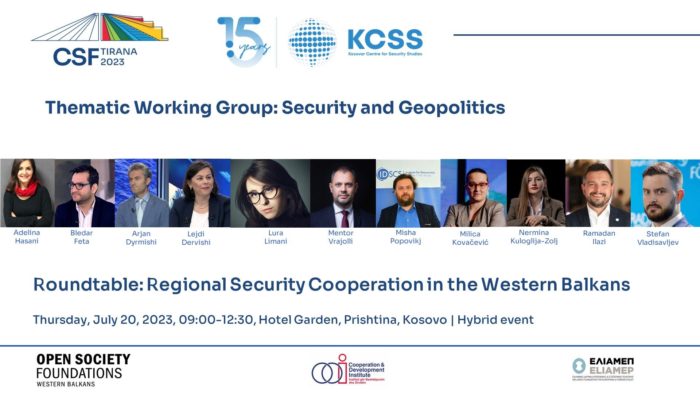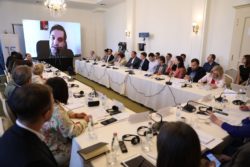Bledar Feta participated in the roundtable entitled “Building Bridges for Enhancing Regional Security in the Western Balkan” organized by the Kosovo Centre for Security Studies (KCSS) in Pristina, Kosovo. This event was organized in the context of the upcoming 2023 Tirana Civil Society and Think Tank Forum (CSF) of the Berlin Process Summit to be held in Tirana, Albania, in October 2023. The Hellenic Foundation for European and Foreign Policy (ELIAMEP) participates together with the Open Society Foundations in the Western Balkans and the Development and Cooperation Institute in Tirana as a co-organizer in the CSF. The South-East Europe Program of ELIAMEP is leading the thematic working group on ‘Politics of Enlargement’ and, simultaneously, its experts participate in the consultation meetings of the other thematic groups, actively contributing to the formulation of the relevant policy recommendations.
KCSS was invited to lead the consultation process and develop a policy paper with actionable recommendations for the Thematic Working Group on Security and Geopolitics, with a focus on regional security cooperation in the Western Balkans. To this end, KCSS organized three online consultation meetings, convening a diverse group of experts from the region. The consultations culminated with a roundtable discussion where regional experts, policymakers, and stakeholders addressed the challenges and opportunities for bolstering regional security cooperation in the Western Balkans.
In his intervention, Bledar Feta made a specific reference to the fragmented cooperation that exist between the countries of the region in the area of security, supporting that “the renewed focus on the enlargement process, mainly because of security reasons, could be seen as a great opportunity to move forward in this significant sector”. However, according to Feta, “security cooperation should not be seen as a tick boxing exercise in the context of the enlargement process because the bridges of cooperation that will be built with this logic will quickly fall”. Feta argued that the Berlin Process also offers significant opportunities. He emphasized the need “to exploit the already existed mechanisms created in the context of the process and at the same time, the necessity to identify new mechanisms better suited to drive the regional security cooperation forward, having always in mind the new geopolitical reality and the new threats it creates for the region”.
Three Online Consultation Meetings
In the context of the Working Group on Security and Geopolitics, the KCSS organized three consultation meetings. The first online meeting took place on 14 June 2023. The purpose of the meeting was to discuss the overall state of play on regional security cooperation in the WB, with respect to existing initiatives, policies, challenges and the positions of the governments in the Western Balkan. On 19 July 2023, took place the second online meeting. Focus was set on areas of relevance for regional security cooperation, respectively how greater regional security cooperation can address: corrosive capital and screening of the Foreign Direct Investments (FDI); Malign foreign influence and alignment with the EU’s Common Foreign and Security Policy; Lack of reconciliation; Political extremism and nationalism/ethnic radicalization, etc. The purpose of the final online consultation meeting held on 30 June 2023, was to discuss the key issues or areas of priority and policy recommendations on how to enhance regional security cooperation in the Western Balkans.
The aim of these consultations is to contribute to the success of the forum. Its success means for us the creation of a fruitful, inclusive, transparent and impartial platform for the civil society to provide its insights on the present challenges and future perspectives of the Berlin Process. In this context, we are currently running a number of consultations in seven different thematic areas such as energy, access to European Single Market, digitalization and connectivity, green agenda and mobility migration. Four consultation meetings for each thematic group have been planned which means that twenty-eight consultation meeting will be held until the end of the process, giving the opportunity to civil society representatives from both the WB and the EU to express their views and positions. Altogether, the aim of the Forum is to achieve a substantial contribution to the Summit, through the developments of concrete policy recommendations in an effort to enhance the convergence of the 6 Western Balkans states and increase the resilience of engaged reforms during the accession process of the region.
You can read more about the project here and the roundtable organized by KCSS here.






